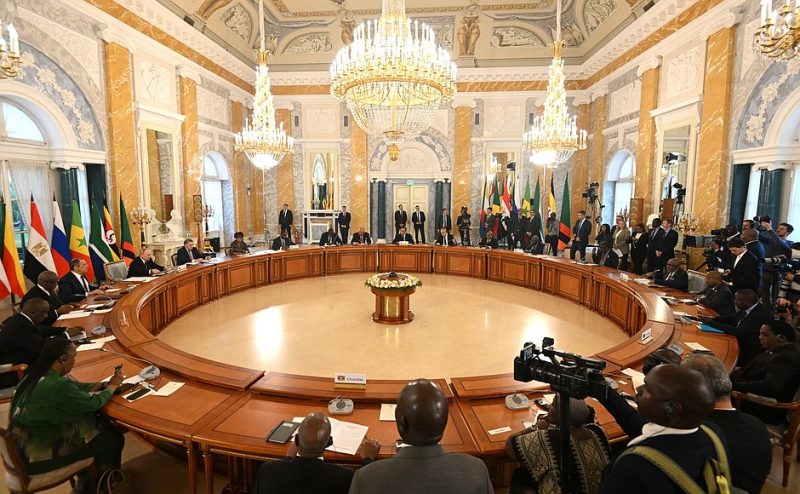On June 17th, President Vladimir Putin met with seven leaders of African countries to discuss a “peace mission.” The presidents of Comoros, Senegal, South Africa, and Zambia, along with Egypt’s prime minister and top representatives from the Republic of Congo and Uganda, traveled from Africa on the 16th to provide relief and help in Ukraine. This group of representatives proceeded to make its way from Ukraine to St. Petersburg to meet with Putin in a self-driven mission for peace and progress amidst a 16-month-long war.
Africa has had close relations with Moscow since the Cold War. South Africa, Senegal, and Uganda have avoided heavy criticism of Russia since hostilities opened in Ukraine. Egypt, Zambia, and Comoros, however, have all publicly voted against Russia in the U.N. General Assembly resolution denouncing Moscow’s actions. Despite their spectrum of positions regarding the conflict, all of these nations joined the peace mission to talk with Putin about ending the war. This is the first time we have seen a mission from numerous African leaders to Ukraine and Russia.
Details from the conference were limited, but it is clear that minimal progress was made. Putin has “shown interest in considering” the peace mission’s proposal, said Dmitry Peskov, a spokesman for the Kremlin. Nevertheless, many are underwhelmed by the result of the talks, which were sparked by disruptions in necessary deliveries from Russia and Ukraine. Africa heavily depends on Russian and Ukrainian food and fertilizer, but the war has obstructed one of the most significant exportation centers. South African president Cyril Ramaphosa openly said at a news conference that the war is “affecting Africa negatively.”
Disruptions in Africa’s food supply are not enough to establish peace, however. “The peace initiative proposed by African countries is very difficult to implement, difficult to compare positions,” Peskov said.
To be satisfied in a peace negotiation, Russia wants Ukraine to recognize the Crimean Peninsula and the various land gains they have made. Ukraine, on the other hand, wants Russia to remove its troops from all of Ukraine’s territories. Due to these contrasting demands, and the nations’ contrasting opinions regarding why the war started, opportunities for negotiations are slim.
Russia has confidently declared that it felt forced to deploy troops into Ukraine because it was threatened and concerned by Ukraine’s desire to join N.A.T.O. and its support from the United States and western Europe. At the economic forum in St. Petersburg on the 16th, Putin announced that Russia has sent its first tactical nuclear weapons to Belarus, describing this in detail as a disincentive to Western efforts supporting Ukraine. When asked if he would use these weapons in Ukraine, Putin remained confident that there should be no need for that, but added that Moscow would not hesitate to use them in case of a “threat to the Russian statehood.”
“In that case, we will certainly use all the means that the Russian state has,” Putin said. “There should be no doubt about that.”
Meanwhile, Ukrainian forces have just recently taken over the village of Blahodatne. Soldiers have been ordered to continue advancing, leading to a continuous, demanding battle.
“Morale is really strong because the [Ukrainian troops] know they’re moving forward to liberate their lands,” said a Ukrainian soldier. “We have an order not to retreat and to move forward, so we’re trying.”
Ramaphosa is aware of the horrific hostilities and is determined to help end this conflict soon. “I do believe that Ukrainians feel that they must fight and not give up. The road to peace is very hard,” Ramaphosa said, but “there is a need to bring this conflict to an end sooner rather than later.”
“The main conclusion, in my opinion, from [the talk with Putin] is that our partners from the African Union have shown an understanding of the true causes of the crisis that was created by the West and have shown an understanding that it is necessary to get out of this situation on the basis of addressing these underlying causes,” said Russian foreign minister Sergey Lavrov.
The African leaders’ efforts show how difficult it is to make concrete progress towards peace when both sides fail to compromise. Successful peace talks will require understanding from both Ukraine and Russia. The devastation will only continue if leaders are not willing to negotiate.
- Ukrainian Soldiers Suffering Due To Scarcity Of Women’s Resources On The Battlefield - September 6, 2023
- Coalition Tensions Threaten Democratic Transformations In Thailand - August 16, 2023
- U.N. Official Calls For U.S. To Shut Down Guantanamo Bay Facility - July 30, 2023


